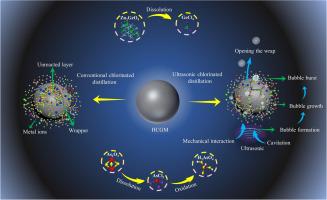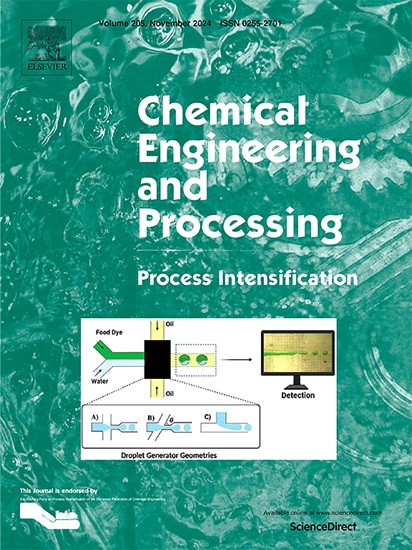Recovery of germanium by chlorinated distillation of high content germanium materials enhanced by ultrasonic external field and arsenic removal
IF 3.9
3区 工程技术
Q3 ENERGY & FUELS
Chemical Engineering and Processing - Process Intensification
Pub Date : 2025-07-25
DOI:10.1016/j.cep.2025.110473
引用次数: 0
Abstract
Chlorinated distillation is widely recognized as the primary technique for the separation and extraction of germanium from germanium-containing materials. However, challenges such as suboptimal extraction efficiency and the removal of arsenic impurities necessitate further investigation. The integration of ultrasonic external field enhancement technology, commonly referred to as ultrasonic field-enhanced distillation, into the chlorinated distillation process is expected to accelerate metal extraction and improve recovery rates. This research presents findings on the application of ultrasonic external field intensification in the chlorinated distillation of high-content germanium materials (HCGM). At an initial acidity of 9 mol·L⁻¹, the addition of 0.25 g·g⁻¹ of NaOCl, a liquid-to-solid ratio of 7 mL·g⁻¹, and an ultrasonic power of 350 W resulted in a germanium evaporation rate of 96.53 % and an arsenic residual rate of 94.57 %. These rates represent improvements of 5.78 % and 8.28 %, respectively, compared to the conventional process. These enhancements were primarily attributed to the cavitation effects of ultrasound, which facilitate the detachment of inclusions from the material and improve the interaction between the oxidant and the material. This process effectively removes the harmful impurity arsenic from the residual liquid, enabling the selective separation of arsenic while efficiently extracting germanium. The byproduct of the reaction is high-grade lead slag, which can be reintegrated into the lead smelting process for recycling. The resulting high-purity germanium material has undergone treatment that renders it both harmless and resource-efficient.

超声外场强化高含量锗材料氯化精馏回收锗及除砷
氯化精馏是目前公认的从含锗物质中分离和提取锗的主要技术。然而,诸如次优萃取效率和砷杂质去除等挑战需要进一步研究。将超声波外场增强技术(通常称为超声场增强精馏)集成到氯化精馏过程中,有望加速金属的提取并提高回收率。介绍了超声外场强化技术在高含量锗材料氯化精馏中的应用。在初始酸度为9 mol·L⁻¹的条件下,在液固比为7 mL·g⁻¹的条件下,在350 W的超声波功率下,锗的蒸发率为96.53%,砷的残留率为94.57%。与传统工艺相比,这些速率分别提高了5.78%和8.28%。这些增强主要归因于超声波的空化效应,它促进了材料中夹杂物的分离,并改善了氧化剂与材料之间的相互作用。该工艺有效地去除了残液中的有害杂质砷,实现了砷的选择性分离,同时有效地提取锗。该反应的副产物为高品位铅渣,可重新纳入铅冶炼工艺循环利用。由此产生的高纯度锗材料经过处理,使其既无害又节约资源。
本文章由计算机程序翻译,如有差异,请以英文原文为准。
求助全文
约1分钟内获得全文
求助全文
来源期刊
CiteScore
7.80
自引率
9.30%
发文量
408
审稿时长
49 days
期刊介绍:
Chemical Engineering and Processing: Process Intensification is intended for practicing researchers in industry and academia, working in the field of Process Engineering and related to the subject of Process Intensification.Articles published in the Journal demonstrate how novel discoveries, developments and theories in the field of Process Engineering and in particular Process Intensification may be used for analysis and design of innovative equipment and processing methods with substantially improved sustainability, efficiency and environmental performance.

 求助内容:
求助内容: 应助结果提醒方式:
应助结果提醒方式:


